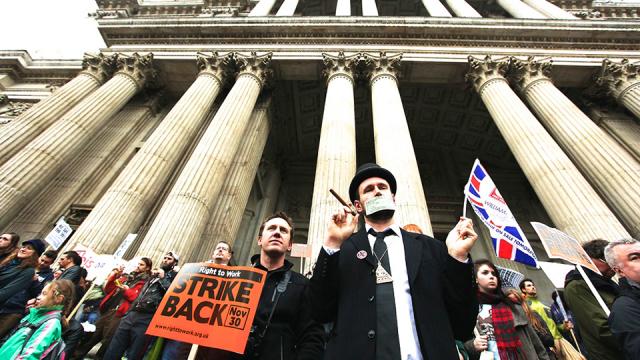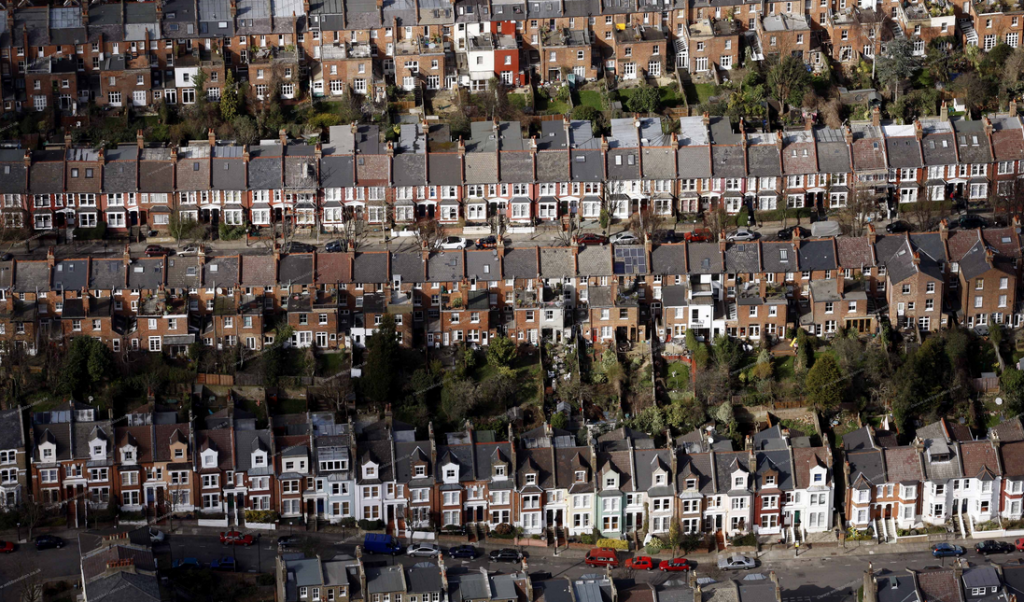
In 2012 my sister, a 38-year-old teacher, bought a two-bedroom flat in London for a little over £300,000. The apartment, whilst modest in size, is located in a sought-after, leafy suburb of South London known as Balham. Last month the decidedly mediocre flat was valued at £600,000.
Once again, the U.K. capital's house prices are soaring, and the impact of the housing boom is widening the gap between the city's rich and poor. On one side there's the privileged homeowners who are literally making money as they sleep.
On the other, there's the renting fraternity, who, unable to get on the property ladder, are forced to pay overinflated rent each month while struggling to make ends meet. Worse still, there are those who cannot afford rent and are driven to the humiliation of returning to their parents, or, in really desperate situations, the streets.
An Economic Powerhouse
When the U.K. plunged into recession in 2007, London was the driving economic force that led the country out of at least some of the financial storm. London owes much of its economic success to the fact that, alongside New York, it is home to the world's largest financial center. “The City” is not only the U.K.'s financial clubhouse, it is one of the major “command centers” for the global economy.
Yet despite its position as a financial powerhouse that played a pivotal role leading the U.K., and even the Eurozone, out of murky economic waters, London is failing many Londoners. Britain's “financially rosy” capital has problems with unemployment, child poverty and low pay. And these economic difficulties are now being worsened by the city's towering house prices.
A Quarter of Londoners Live in Poverty
A 2013 study revealed that 28% of people in London are living in poverty, which is 7% higher than the rest of England. The study was compiled by London's Poverty Profile, an independent information source about poverty and inequality in the capital.
The survey used the “official” definition of poverty to pool its results, meaning households with an income of less than 60% of the national median income that year. In 2013 the unemployment rate hovered at 7% in London, which is higher than the national average.
Meanwhile, the number of 16- to 24-year-olds living in the capital has increased to approximately 1 million – and those out of work amongst this age group in London has risen from 15% to 20% during the last 10 years.
Record High House Prices
Alongside the increasing levels of poverty and unemployment levels in London, house prices are rising at the fastest rate in four years. The bellowing gap between London's property “haves” and “have nots” widened yet again in January 2014, when the average price of a home surged by another £8,000.
With a national average wage in the U.K. of £26,000, it doesn't take an economist or financial adviser to explain why a large majority of Londoners cannot afford to buy property, which now averages at a record high of £409,881. Renting is therefore the only alternative, but even that has become unrealistic for many.
Compounding the growing rent prices are new restrictions on housing benefits, making wider parts of London unaffordable to those subsisting on low or even average incomes.
“Londoners are trying hard but are getting stuck, with many being impacted by high housing costs and housing benefit reforms, unemployment and low pay,” Bharat Mehta, chief of the Trust for London charity, told the BBC.
“To tackle London's poverty and inequality, policymakers must focus on solutions such as building more affordable housing and encouraging employers to pay a living wage,” Mehta said.
New Property Aimed at Wealthy Buyers
But instead the creating affordable housing solutions in London, the opposite is happening. Alongside a housing shortfall, which is running at more than 20,000 homes a year, many properties under construction are aimed at wealthy buyers.
According to research, businesses themselves might be forced out of the capital because their employees simply cannot afford to live there. Research by Savills estate agency shows that despite more than 50% of housing demand in London stemming from people on annual incomes of less than £50,000, developers are focusing on properties at the higher end of the market.
To exemplify how unbalanced the housing bubble is becoming, London Ministers of Parliament last month reported they could no longer afford to buy homes in their own constituencies, admitting that a £66,400 annual salary was not enough to purchase a roof over their heads.
Reports also emerged about “Islington dinner party sets” shifting from “smugness” to concern over rising house prices when they realized their children could not afford to buy a home.
“The capital's housing crisis is as much about the young professional couple unable to buy their first home as about the family of five who rent an overcrowded flat from a slum landlord,” said Ms. Alexander, a Lewisham East MP.
Which begs the question: If MPs can't afford property in London, what chance do the rest of us have?
Londoner Claire Brookes is a part-time sales rep and mother of two. Her husband is a carpenter and earns £28,000 a year. With the escalating price of rent and without any chance of being able to buy their own property, the Brookes family had little other option but to go back and live with Claire's parents.
“For the past two years, we've been living with my mum and dad," Claire, 29, told Occupy.com. "A two-bedroom apartment in East London isn't ideal for a family of four, let alone four adults and two children."
“All the new housing being built in London is aimed at the super wealthy," she continued. "Meanwhile those on low incomes are forced to live like squatters in cramped conditions. If something doesn't change soon, we'll have one option only: to move out of London. Of course that would mean us both finding new jobs, which is easier said than done. It's a no-win situation.”
You may wonder how my sister, on a teacher's salary, has been able to climb the increasingly discriminatory London property ladder. An accumulation of a sizable deposit, several timely promotions at work, and buying and selling at the right time and in the right areas now means she is amongst the increasingly sparse property-owning elite.
And as the yawning chasm between homeowners and non-homeowners in the British capital becomes bigger, so does the city's wealth inequality. London's rising house prices have coincided with a sharp increase in homelessness. Pregnant women and children are being forced to live in temporary accommodation, while 2,100 homeless families inhabit emergency bed and breakfasts.
Yet while the poor get more deeply immersed in poverty, and the home equity pounds clock up at a prolific pace for the owners of property, a basic question seems still to go unanswered: Is any of this right?
3 WAYS TO SHOW YOUR SUPPORT
- Log in to post comments












